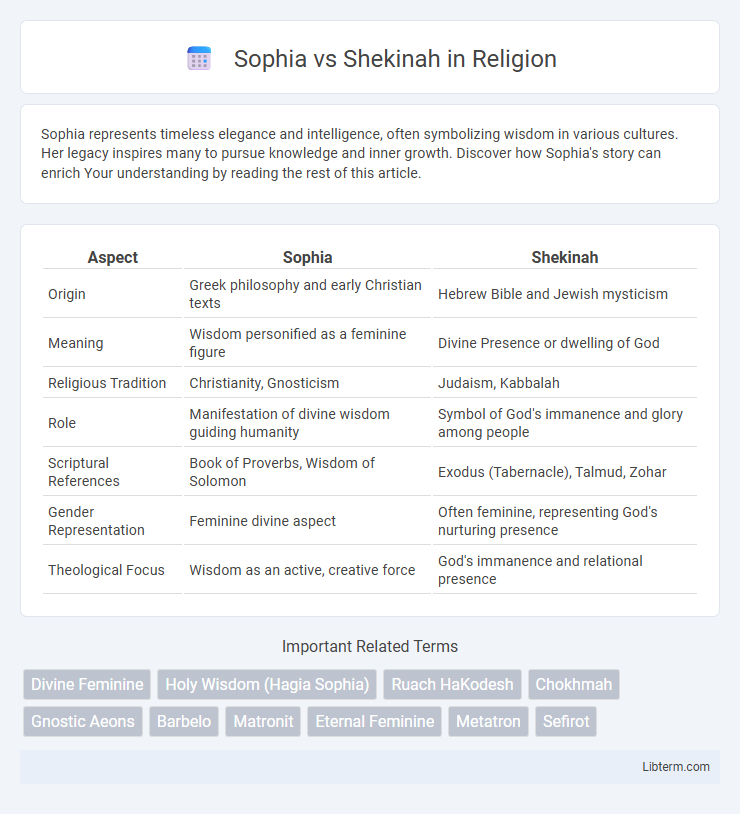Sophia represents timeless elegance and intelligence, often symbolizing wisdom in various cultures. Her legacy inspires many to pursue knowledge and inner growth. Discover how Sophia's story can enrich Your understanding by reading the rest of this article.
Table of Comparison
| Aspect | Sophia | Shekinah |
|---|---|---|
| Origin | Greek philosophy and early Christian texts | Hebrew Bible and Jewish mysticism |
| Meaning | Wisdom personified as a feminine figure | Divine Presence or dwelling of God |
| Religious Tradition | Christianity, Gnosticism | Judaism, Kabbalah |
| Role | Manifestation of divine wisdom guiding humanity | Symbol of God's immanence and glory among people |
| Scriptural References | Book of Proverbs, Wisdom of Solomon | Exodus (Tabernacle), Talmud, Zohar |
| Gender Representation | Feminine divine aspect | Often feminine, representing God's nurturing presence |
| Theological Focus | Wisdom as an active, creative force | God's immanence and relational presence |
Introduction to Sophia and Shekinah
Sophia and Shekinah represent distinct yet profound concepts in spiritual and mystical traditions, with Sophia embodying divine wisdom in Gnostic and Christian theology, often depicted as a feminine figure emanating wisdom and guiding creation. Shekinah, in Jewish mysticism, signifies the dwelling or presence of God, highlighting an immanent divine manifestation that dwells among people and sanctifies sacred spaces. Both concepts emphasize a dynamic interaction between the divine and the world, illustrating different facets of spiritual connection and enlightenment.
Origins: Sophia in Greek Philosophy and Shekinah in Hebrew Mysticism
Sophia originates from Greek philosophy as the embodiment of wisdom, prominently featured in Platonic and early Christian texts symbolizing divine knowledge and insight. Shekinah stems from Hebrew mysticism, particularly within Kabbalistic tradition, representing the divine presence or dwelling of God among humans. Both concepts articulate aspects of divine wisdom and presence but arise from distinctly different cultural and theological frameworks.
Defining Sophia: The Wisdom Principle
Sophia, often personified in Gnostic and early Christian thought, represents the divine Wisdom principle as a feminine aspect of God, embodying insight, understanding, and the creative force behind existence. She is depicted as an intermediary between the divine and material worlds, guiding souls toward enlightenment and spiritual knowledge. In contrast, Shekinah denotes the dwelling or manifestation of God's presence in the world, emphasizing God's immanence rather than the intellectual and cosmic dimensions associated with Sophia.
Understanding Shekinah: The Divine Presence
Shekinah represents the divine presence or dwelling of God in Jewish mysticism, emphasizing God's immanence and accessibility to humanity. Unlike Sophia, which is often personified as divine wisdom in Hellenistic and Christian traditions, Shekinah embodies the tangible and compassionate aspect of God's presence on Earth. Understanding Shekinah involves exploring its role in connecting the divine with the physical world, often manifested through light, sanctity, and spiritual dwelling.
Sophia and Shekinah Across Religious Texts
Sophia, often depicted as divine wisdom in Gnostic texts and the Hebrew Bible's Proverbs, symbolizes the feminine aspect of God's wisdom guiding creation and moral order. Shekinah, rooted in Jewish mysticism and Kabbalah, represents the dwelling or presence of God, embodying a divine feminine force manifesting God's immanence among humanity. Both entities serve as personifications of divine presence and wisdom, with Sophia emphasizing cosmic order and enlightenment, while Shekinah highlights God's intimate relationship with the world and the spiritual restoration of divine harmony.
Feminine Divine: Comparing Attributes
Sophia and Shekinah represent distinct aspects of the Feminine Divine, with Sophia embodying wisdom and intellectual illumination in Gnostic and Hellenistic traditions. Shekinah, rooted in Jewish mysticism, signifies the divine presence or dwelling, emphasizing nurturing and immanence. Both figures highlight complementary dimensions of feminine spirituality, blending wisdom, compassion, and divine presence in sacred narratives.
Sophia in Christian and Gnostic Traditions
In Christian and Gnostic traditions, Sophia represents divine wisdom personified as a feminine figure embodying spiritual knowledge and insight. Within Gnostic texts, Sophia's actions often explain the creation of the material world and the human soul's journey, emphasizing her role in imparting mystical understanding and enlightenment. Christian interpretations associate Sophia with the wisdom attributed to God in scripture, linking her to the Holy Spirit or Christ as an expression of divine revelation and guidance.
Shekinah in Kabbalistic Teachings
Shekinah in Kabbalistic teachings represents the divine feminine presence of God dwelling within the material world, signifying God's immanence and nurturing aspect. Unlike Sophia, rooted in Greek philosophy as wisdom personified, Shekinah embodies the spiritual aspect linking the infinite divine to finite creation, often associated with the sefirah of Malkhut on the Tree of Life. Kabbalists emphasize Shekinah's role in spiritual restoration and unification, highlighting her as a mediator between God and humanity within mystical Jewish thought.
Symbolism and Iconography: Sophia vs Shekinah
Sophia, symbolizing divine wisdom in Greek philosophy and Christian mysticism, is often represented by light, a dove, or a woman with a book, emphasizing knowledge and enlightenment. Shekinah, rooted in Jewish mysticism, signifies the divine presence or dwelling of God, frequently depicted as radiant light or a feminine aspect of God, symbolizing nurturing and immanence. Both icons highlight femininity and divine connection but differ as Sophia centers on wisdom's illumination, while Shekinah embodies God's comforting presence within the world.
Contemporary Interpretations and Relevance
Sophia, often personified as divine wisdom in Gnostic and Christian mysticism, represents an archetype of feminine insight and cosmic order, resonating with contemporary spiritual movements emphasizing inner knowledge and empowerment. Shekinah, rooted in Jewish mysticism as the divine presence or dwelling of God, is increasingly interpreted in modern spirituality as a symbol of immanence and experiential holiness in everyday life. Both concepts remain relevant in contemporary discourse by inspiring feminist theology and interfaith dialogue, highlighting the evolving understanding of the divine feminine in today's religious and philosophical contexts.
Sophia Infographic

 libterm.com
libterm.com